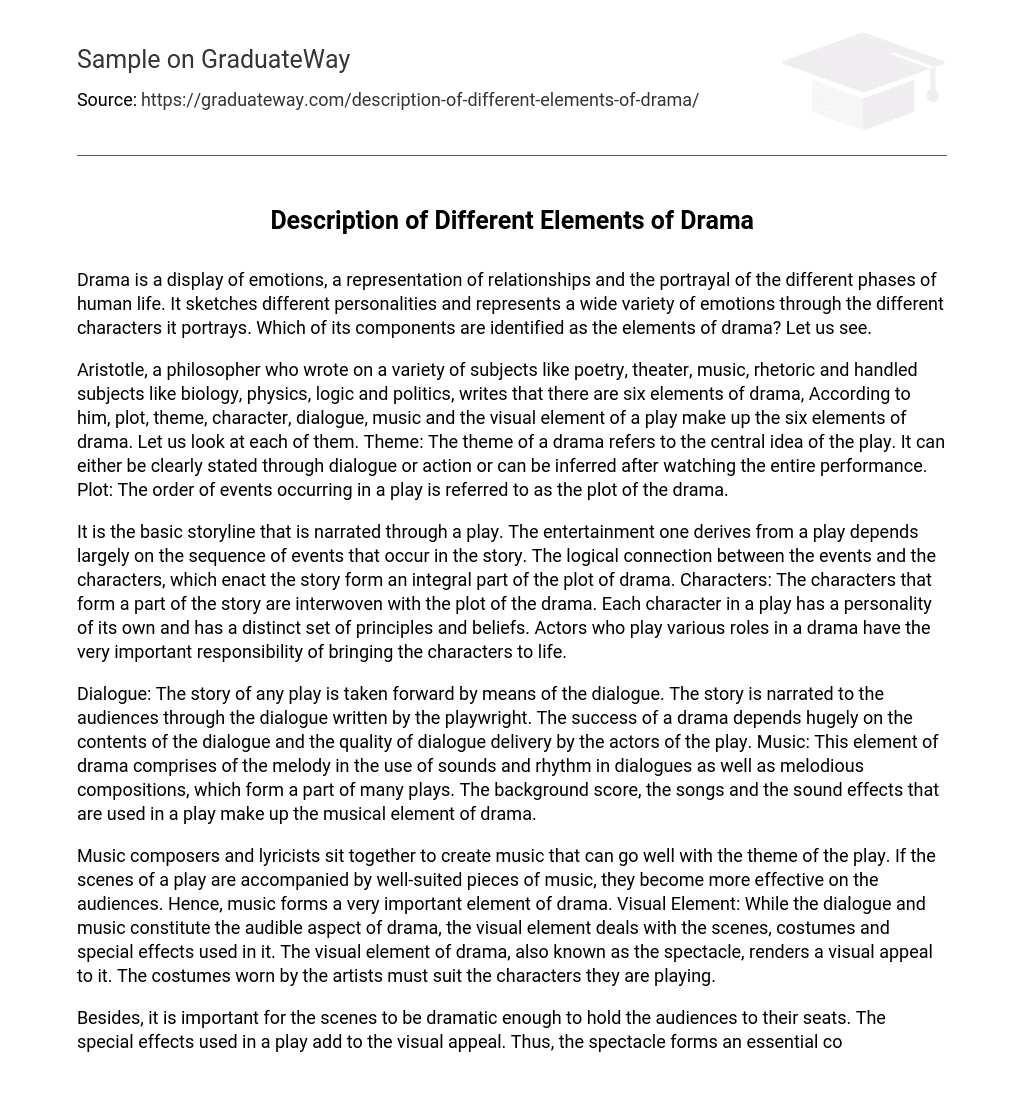The constituents of drama are recognized as the visual expression of feelings, the depiction of connections, and the illustration of various stages of human existence. Drama delineates diverse identities and showcases a vast range of emotions through its characters.
Aristotle, a philosopher who wrote on various subjects such as poetry, theater, music, rhetoric, biology, physics, logic, and politics, states that drama consists of six elements. According to him, the six elements of drama are plot, theme, character, dialogue,
music,
and the visual element. Each of these elements will be examined below.
Theme: The central idea of a play is referred to as its theme. It can be explicitly expressed through dialogue or action or inferred by observing the entire performance.
Plot: The sequence of events in a play is called the plot of the drama.
The plot of a play is the fundamental narrative that unfolds. The enjoyment one experiences from a play relies heavily on the progression of events in the story. The plot of drama consists of the logical connection between the events and the characters who perform in the story. Characters in a play are intricately linked to the plot. Every character possesses their own unique personality and set of principles and beliefs. The actors who portray various roles in a drama carry the vital duty of bringing these characters to life.
Dialogue is a crucial aspect of drama as it propels the story forward. It is crafted by the playwright and performed by actors, greatly impacting the success of a play. Additionally, music holds great significance in drama through its incorporation of sounds, rhythmic elements in dialogue, and melodious compositions. This musical component encompasses background scores, songs, and sound effects utilized within a play.
Collaboration between music composers and lyricists is essential in creating music that enhances the theme of a play, thereby intensifying its impact on the audience. This highlights the crucial role of music in drama. Furthermore, the visual component, encompassing scenes, costumes, and special effects, adds to the overall attractiveness of the performance. The spectacle aspect of drama brings an engaging visual dimension. Adequately fitting costumes for each character are imperative for the artists.
Moreover, the scenes must be sufficiently dramatic to captivate audiences and keep them engaged. Additionally, the utilization of special effects in a play enhances its visual allure, making spectacle an integral aspect of drama. In addition to Aristotle’s specified elements of drama, the story’s structure, skillful employment of symbolism and contrast, and stagecraft are also crucial elements. The structure of the story encompasses how it is presented to the audience, including the characters’ portrayal and the overall framework of the narrative.
Direction is a crucial element in a play as it enhances its popularity. Stagecraft also contributes to the visual appeal by incorporating various props and setting up the stage. Symbols, when used effectively, provide indirect suggestions, making a scene more impactful. Contrast, in the form of stillness followed by activity or silence followed by noise, is another technique that adds depth to a performance.
The concept of contrast can be applied in various ways, such as using contrasting colors to enhance visual appeal or incorporating contrasting scenes to heighten the dramatic element in a play. An enthusiastic audience plays a vital role in drama as they provide constructive criticism and generous appreciation for quality performances. Many successful playwrights today still adhere to the theories of playwriting and drama laid out by Aristotle over two millennia ago.
Aristotle’s Poetics outlines the six elements of drama in his analysis of the classical Greek tragedy Oedipus Rex by Sophocles in the 5th century B.C. These elements include: Thought, Theme, Ideas; Action or Plot; Characters; Language; Music; and Spectacle. The first element, Thought/Theme/Ideas, refers to the play’s meaning rather than its plot. Sometimes the theme is explicitly stated in the title or conveyed through dialogue by a character speaking on behalf of the playwright. In other cases, the theme may be less apparent and requires closer examination or reflection.
The abstract issues and feelings that arise from the dramatic action are the theme of a play. The events of a play, known as the action or plot, focus on what happens rather than what it means. To maintain unity and clarity, the plot must establish a pattern where each action leads to the next, rather than standing alone without connection to what came before or follows. In the plot, characters engage in conflict with a specific pattern of movement. The play’s action and movement start with the initial entanglement, then progress through rising action, climax, falling action, and ultimately resolution. Characters are individuals involved in pursuing the plot, each having their own unique personality, age, appearance, beliefs, socio-economic background, and language.
4. Both language and music play crucial roles in theatre productions. The selection of words by the playwright and the actors’ delivery of their lines contribute significantly to the plot and character development. Each playwright exhibits a distinct style when it comes to language and dialogue. Furthermore, music can be employed to enhance the rhythm and melody of a play, encompassing both spoken dialogue and musical compositions, particularly in musical theatre. While not all plays incorporate music, it serves as a means to encompass all auditory aspects within a production, including sound effects, songs, and instrumental music. Ultimately, music aids in establishing patterns and setting tempo in theatrical performances.
The plot of the musical is advanced and intensified through the use of songs, as composers and lyricists collaborate with playwrights to enhance the play’s themes and ideas. Lyrics and music contribute to strengthening the desires and motivations of the characters for the audience. In theatre, spectacle encompasses scenery, costumes, and special effects, all of which create the visual elements that establish the world and atmosphere of the play for the audience’s appreciation.





